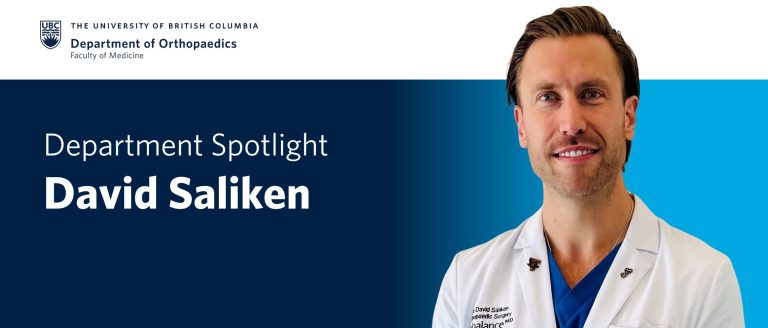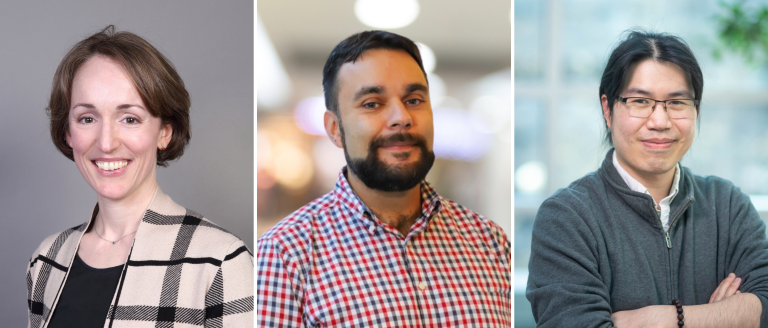
TAQDIR ALI
Postdoctoral Fellow
Division:
Pediatric Orthopaedics
Site:
Vancouver – BC Children’s Hospital
Dr. Taqdir Ali is a postdoctoral research fellow in the Department of Orthopaedics at UBC, where he is applying artificial intelligence (AI) to advance diagnostic and treatment strategies for complex pediatric musculoskeletal conditions. With a PhD in computer engineering and over seven years of experience in the software industry—including roles as a software engineer, software architect, and AI researcher—Dr. Ali brings a unique interdisciplinary perspective to orthopaedic research.
His work aims to build data-driven, patient-centered healthcare systems that are more proactive, personalized, and sustainable. He is the recipient of the 2024 Michael Smith Health Research BC Trainee Award for his project on AI-driven fracture identification and decision support in orthopaedics, and previously received the Best Research Achievement Award from the Korean Society of Heart Failure in 2019.
Could you share your educational background and journey, and how these experiences shaped your current role?
I began my academic journey with a Bachelor of Science in Computer Science from Kohat University of Science and Technology (KUST), Pakistan. After completing my BS in Computer Science, I spent over seven years working in the software industry in various roles, including as a software engineer, software architect, and artificial intelligence (AI) researcher. During this time, I built a solid foundation in computer science, with a strong focus on software development, shaped by the region’s long-standing traditions in the software industry.
Driven by a deep passion for software development and inspired by the rapid pace of innovation in AI, I was motivated to pursue a research-oriented career in IT, with a specialized focus on AI applications in healthcare. During my doctoral studies at Kyung Hee University, South Korea, my research focused on the development of interoperable and shareable medical knowledge frameworks, leveraging AI to address a wide range of diseases and clinical conditions.
I then moved to Canada to engage with its global research environment and completed a postdoctoral fellowship in the Department of Medical Genetics at BC Children’s Hospital Research Institute and UBC. This experience further strengthened my focus on applying intelligent systems to complex healthcare challenges. As a result, I joined the UBC Department of Orthopaedics to advance diagnostic and treatment strategies for complex and variable pediatric musculoskeletal conditions—aiming to bridge computational innovation with clinical practice to enhance patient outcomes.
What inspired you to work in orthopaedics, particularly in Artificial Intelligence?
My inspiration to work in orthopaedics—particularly at the intersection with artificial intelligence —stems from a desire to address the diagnostic and treatment complexities of pediatric musculoskeletal conditions. The inherent variability and developmental intricacies of the pediatric skeletal system present unique challenges that traditional methods often struggle to manage effectively. With my background in computer science and AI, I saw an opportunity to contribute meaningfully by developing intelligent systems that support clinical decision-making, improve diagnostic accuracy, and ultimately enhance patient care.
What impact would you like to see your work have on patients, communities and society at large?
The objective of my work is to find and implement intelligent solutions for complex diagnostics and treatment decision-making, and significantly enhance their accuracy, efficiency, and accessibility through the integration of AI into clinical practice. By developing intelligent systems, I aim to reduce diagnostic uncertainty, reduce human malfunctions, enhance healthcare professionals’ performance, facilitate early intervention, and ultimately improve patient outcomes. At a broader societal level, I envision my work contributing to the advancement of data-driven healthcare systems that are more proactive, personalized, and sustainable—benefiting not only patients and clinicians but also healthcare communities and policy development.
What aspects of your work excite you the most?
What excites me most about my work is the opportunity to drive innovation at the intersection of artificial intelligence and clinical care—translating advanced computational models into meaningful improvements in patient diagnosis, treatment, and outcomes. I am particularly energized by the potential of AI to support clinicians in complex decision-making processes, especially in fields like orthopaedics where variability and diagnostic uncertainty can significantly impact care.
What achievements are you most proud of?
I am most proud of receiving the 2024 Michael Smith Health Research BC Trainee Award for my project, “Advancing Orthopaedics Diagnostic Intelligence: Deep Learning and Generative AI Models for Fracture Identification and Dialogue-driven Documentation and Decision Making.” This recognition not only validates the significance of my research but also reflects my commitment to advancing patient-centered, AI-driven solutions in musculoskeletal healthcare.
Earlier in my career, I was also honoured with the Best Research Achievement Award at the 39th Annual Meeting of the Korean Society of Heart Failure in 2019 for my innovative work on “Artificial Intelligence for the diagnosis of heart failure.” This achievement marked a pivotal moment in my research journey and reinforced my dedication to contributing impactful, interdisciplinary work across medical domains. Both milestones represent the progress and promise of my efforts to bridge technology and clinical practice for the betterment of healthcare systems and patient outcomes.
What advice would you offer to new researchers?
My advice to new researchers is to remain open to interdisciplinary collaboration—particularly with emerging fields like data science and artificial intelligence. The future of orthopaedics lies not only in surgical expertise and clinical acumen but also in embracing technologies that can enhance diagnosis, personalize treatment, and support clinical decision-making. By actively engaging with innovation and research, fellows can help shape more efficient, data-driven, and patient-centered care. Balancing clinical excellence with a forward-looking mindset will be key to advancing both their own practice and the field at large.
When you’re not working, where can we find you?
When I’m not working, I enjoy spending time outdoors—hiking, cycling, and playing basketball help me recharge and stay active. I also value quiet moments reading books and listening to Urdu and Pashto music, which keeps me connected to my cultural roots. On weekends, I often spend quality time with my family, going on outings and exploring nature together. These activities help me maintain a healthy work-life balance and bring renewed energy to my professional life.






